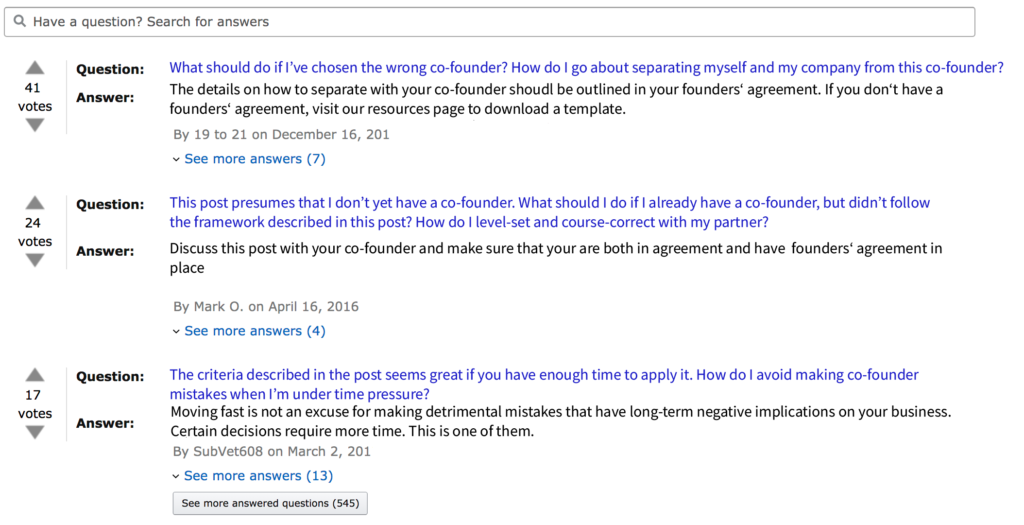Should You Add a Co-Founder?

Do the benefits of having a co-founding partner really outweigh the significant long-term costs it carries? Will having a co-founder add more value than hiring an executive or technical expert? We talked to leading entrepreneurs, including the co-founders of MongoDB and Tinder, who share some lessons they learned about having a co-founder.
Co-Founder BENEFITS
- Add additional perspective
- Share financial responsibility & stress
- Provide emotional support
- Attract talent
- Mitigate risk for investors
Co-Founder DRAWBACKS
- Diminish your authority
- Decrease your financial stake
- Increase the risk of conflict
- Complicate decision-making
- Dilute culture if misaligned
Context Matters
Respected entrepreneurs—like Peter Thiel, Jessica Alter, and Steve Blank—agree that having a co-founder adds value to a startup in several ways. But experts often disagree about when to seek and how to attract the best co-founder. Y Combinator co-founder Paul Graham observes that conflict between co-founders is a leading cause of startup failure. Dinesh Moorjani, co-founder of Tinder, notes that “startups that never get off the ground or don’t reach escape velocity often fail because there is an altercation among co-founders.” When should you risk taking on a partner who will dilute your equity and authority? Most start by comparing the credentials and skills of candidates against potential dilution. But that’s only one part of the puzzle. It’s important to assess those aspects in the larger context of a partnership.
Co-Founders Do 3 Unique Things
- Experience the Ups & Downs of the Founding Journey
- Strengthen the Credibility of Your Business
- Help Establish & Model Company Values & Ethos
 Experience the Ups and Downs of the Founding Journey
Experience the Ups and Downs of the Founding Journey
Unique Personal Commitment
Starting a business tests your emotional fortitude. Unforeseen obstacles that make the journey lonely and anxiety-producing will arise. A talented early team can offer alternative perspectives for problem-solving. But one key difference between hiring a qualified manager and a co-founder involves a level of commitment and personal investment. Unlike upper-level management who take direction and cues from you, a co-founder lives with you in the trenches. Your co-founder becomes a true partner—someone who weathers the highs and lows you can’t predict at the outset.
The story of Careem, a ride-hailing service in the Middle East and North Africa (MENA), exemplifies the critical role co-founders play during scaling. Within 6 years of launching, Careem became one of the first unicorns in the MENA, surpassing the performance of competitors. Because they were competing with the industry giant, Uber, Careem’s co-founders set aggressive growth targets of between 20-30% per month.
Emotional Support
Co-founder Magnus Olsson remembered that operations often broke and employees increasingly struggled to maintain the pace. As they raced to expand, early colleagues would come to complain about “how crappy things are becoming.”
“There were a million things going on and, as a founder, I ended up feeling like a failure every day. It’s painful—emotionally draining. You have things breaking all the time. And on top of that, you’re feeling like you’re failing.”
Magnus Olsson
Olsson stresses that sharing the relentless pressures and extreme ups and downs with co-founders Mudassir Sheikha and Abdulla Elyas was invaluable. The company’s impressive success is a testament to the strong relationship between its co-founders.
Jumping Off the Cliff
Sunil Nagaraj, founding partner of Ubiquity Ventures, co-founded Triangulate—a startup that developed profile matching platforms for social networks—with a close friend in 2009. Starting a company is like jumping off a cliff, he remembers, “doing it holding someone else’s hand helps.”
“Starting a company is always an irrational decision,” he shares, “and there’s never enough information.” When you’re “hunting for an idea or proof that something is a good idea,” having a co-founder is invaluable. That someone wanted to join you in founding the venture validates your idea. He rationalizes, “At least I won’t look stupid if it fails,” because someone else believed in the idea and joined me. Nagaraj shares, “I was really hunting for proof that it was a good idea, and to have someone join me who was comfortable, who I knew, was a huge relief” initially.
Starting a company is always an irrational decision and there’s never enough information. Any kind of handhold that you can grab onto to help climb the mountain is really, really, helpful.
Sunil Nagaraj
Alternative Perspective & Balance
Similarly, serial entrepreneur Lara Hodgson acknowledges that having a co-founder provides priceless benefits. But experience has taught her that, “most of us pick them for the wrong reason.” When choosing co-founders for earlier ventures, she explains, “I was trying to find skill sets to round out my skill sets.” But she learned that “if you’re really just trying to acquire a skill set, you’re probably better off hiring that person.”
Instead, of searching for partners to round out your skills, look for co-founders who can provide a different perspective, have diverse experiences, and can add balance, she advises. As CEO and President of her latest venture, NOW Corporation—a B2B payments company—she especially values the diverse perspective and emotional balance that her co-founders add to the company.
Employees bring skills, but a partner brings a different thought process and mindset.
Lara Hodgson
“A lot of times, entrepreneurs are optimists. We see opportunity in things. Sometimes you need somebody to say, ‘Are we thinking about this the right way? Have we looked at other opportunities, other alternatives?’ Having a partner helps you balance not only the business, but the rest of your life.”
Lara Hodgson
Should You Add a Co-Founder? Ask Yourself:
- Am I seeking out a partner to round out my skills?
- Could I hire someone instead of adding a partner?
- Would I be better off with someone by my side to share the ups and downs of the journey?
 Strengthen the Credibility of Your Business
Strengthen the Credibility of Your Business
Having an appropriate co-founder enhances your credibility in crucial ways.
Minimize Investment Risk
Investors look favorably on ventures with dual founders. The Startup Genome Project reports that solo founders take 3.6 times as long to scale as 2-person founding teams. Additionally, they are 2.3 times less likely to pivot successfully. Balanced teams with 1 technical founder and 1 business founder raised 30% more money. They had nearly 3x more user growth and were 19% less likely to scale prematurely.
Are you producing a tech-dependent product but lack deep technical expertise? Research indicates that tech-based startups without a technical co-founder have a lower probability of success. Thus, finding a technical co-founder can significantly boost your chances of raising capital and scaling appropriately.
Complementary Strengths
“Ultimately, a startup is not an individual. It’s a collection of talented folks.”
Dinesh Moorjani
Moorjani underscores, “you want someone who can complement your capabilities” whose strengths and skills differ from yours. Before searching for a cofounder, take inventory of your team’s strengths and weaknesses. Then realistically assess your own shortcomings and knowledge gaps. Look for domain experts who complement the skills you bring to the table. Steve Blank advocates using a simple tool, the Business Model Canvas, as a way to help you identify key areas where you need expertise.
For instance, maybe you’re a technical genius working with a team of talented engineers to build a mobile app. But before you start building consumer products from an engineering perspective, consider the advantages of adding a partner who has strong expertise in user-design or marketing. A co-founder with such different strengths could propel your startup forward in several ways.
“The goal is not to replicate skills. Rather, it’s to diversify skills specifically aligned with the biggest risk areas or core competencies you need for the company to be successful.”
Dinesh Moorjani
Attract Talent
A co-founder with expertise in a core area can enhance your ability to attract and retain talent. Careem followed this principle. Within its first 2 years, the company hired several C-level executives. But when the company expanded across the Middle East, the co-founders chose not to recruit another skilled manager. Instead, Olsson and Sheikha invited Abdulla Elyas to join them as a co-founder. Elyas, whose work provided the first global address solution, possessed complementary tech skills. More importantly, he had deep knowledge of local Saudi Arabian markets.
Similarly, Kevin Ryan, founder of AlleyCorp, values adding a co-founder who possesses assets or characteristics critical to the venture’s success. After conceptualizing ideas for diverse businesses, including Gilt Groupe, Business Insider, and MongoDB, Ryan searches for appropriate co-founders. What criteria does he recommend? Ryan looks for two things. First, he asks, “what is the most important skill for this company?”
Then, he searches for people who possess that core skill and can attract talent. In some cases, the person may not seem like the obvious choice. But prioritizing that the core skill has enabled Ryan’s companies to flourish.
Should You Add a Co-Founder? Consider:
- What skills, expertise, or knowledge do I lack that are critical to the operation of my business?
- Would having a partner help me attract top talent to build a strong team for this venture?
 Help Establish & Model Company Values & Ethos
Help Establish & Model Company Values & Ethos
Unlike an employee who follows your direction, a co-founder shares the power to establish company values. They also model those values, internally and externally. So it’s imperative that you align on values.
Before Careem’s co-founders invited Elyas to join them as a co-founder, they brought other senior executives and gave them shares of equity. They felt motivated to create a co-founder role for Elyas primarily because “we felt we had a complete values match.” Olsson described that the usual considerations—cap tables and equity splits—as completely secondary.
“You’re talking about bringing on a person that’s going to be part of the founding group that’s ultimately responsible for values. It’s huge decision that has nothing to do with equity.”
Magnus Olsson
Bringing Elyas in as a co-founder sent a public message that Careem respected local differences. It also aligned with one of Careem’s core values: generating a sense of local ownership and employee investment. Though the 3 co-founders come from diverse backgrounds, they share and model uniform values company-wide. Olsson laughs, “we are a Swedish guy, a Pakistani guy, and a German-Saudi guy. Very different. But at some very core values basis, we all believe in doing something purposeful.”
Adding the right co-founder can greatly help you in establishing your company’s values and modeling culture. But is adding a co-founder always the right move?
Could Adding a Co-Founder Could Weaken Your Startup?
Sometimes, a founder may feel pressured to add a co-founder. For instance, if you’re struggling to attract talent or a particular domain expert, you may feel tempted to sweeten the compensation package by giving them a co-founder. Or, if you’re applying to an accelerator program that requires all applicants to have a CTO co-founder—someone who owns at least 10% of the company in the form of equity—you may decide you need to add a partner.
Moorjani cautions founders to resist the temptation to structure a co-founder relationship based on artificial purposes. Adding a co-founder to meet short-term goals is “a myopic way of approaching the market.” Using a co-founder title to draw talent presents long-term risks. “It essentially dilutes the value of the initial co-founders” on multiple levels. It “immediately strains your culture and sets a bad precedent.”
Offering a co-founder title to attract talent or to get a particular domain expert onboard essentially dilutes the value of the initial co-founders. It strains your culture and sets a bad precedent. And if everybody thinks they’re a co-founder it can lead to conflict on the management team.
Dinesh Moorjani
Unintended Consequences of Adding a Co-Founder
If you have an early engineer, he explains, “and later you hire later a CTO and give them a co-founder title it’s really a slap in the face to the early employee who was there from the beginning.” Adding co-founders “can have a lot of unintended consequences down the road as that company scales as those employees stay on board.”
Because co-founders play such a prominent role in establishing company culture, adding the wrong co-founder or choosing a co-founder for the wrong reasons can create unintended consequences as you scale. For that reason, Moorjani advises founders to think carefully before you add a co-founder. And always weigh short-term needs with long-term visions. Remember to consider the potential co-founder’s cultural fit within the company.
“Don’t slot everyone in as a co-founder simply because that’s what it takes to bring them over the line.”
Dinesh Moorjani
Should You Add a Co-Founder? Ask yourself:
- Does this person share the core values of my company?
- Am I considering adding this person to fulfill short-term requirements?
EXPLORE MORE
How Do Leading Entrepreneurs Evaluate the Need for a Co-Founder?
Popular resources claim that startups with solid management teams have a better chance of attracting investment and succeeding. But they offer contradictory advice on how and when to seek a co-founder. Does a non-technical co-founder should seek a technical co-founder. And, if so, when should you begin the search? We scoured hundreds of articles and talked with experts about this issue. We recommend the following practical guidelines and insights:
Benefits of a Co-Founder
- In “Five Reasons To Consider Hiring A Co-Founder,” Ludovic Huraux, CEO of Shapr, notes that co-founders provide additional perspective. Co-founders also help cover your weaknesses, keep you grounded, strengthen your position with investors, and enable you to do more.
- In “Thinking of Going Solo? 7 Reasons You Need a Co-Founder,” Adam Callinan, co-founder of BottleKeeper and investor, highlights reasons why having co-founder is beneficial including, emotional support, stress distribution, and counterbalancing ideas.
Resources for Finding Co-Founders
- In “Looking for Love in All The Wrong Places – How to Find a Co-founder” serial entrepreneur Steve Blank advocates using a simple tool, the Business Model Canvas as a way to help you identify key areas where you need expertise. Once you understand your unique needs, he advocates engaging in a hackathon or other projects together. Throughout those interactions, assess the person’s approach, for instance, how do they resolve conflicts? “You want someone who exhibits intense focus in chaotic situations, keen decision-making skills when faced with little data, relentlessness, agility, and curiosity.”
- In “A Tech Founder’s Guide To Picking A Non-Tech Founder,” Jessica Alter, founder of FounderDating, provides basic tips on the most qualities a non-technical co-founder should possess. She recommends starting a side-project with your potential co-founder as “it’s easier to assess someone while you’re working on something real together.” She notes, “Your cofounder is your partner – through every decision, every idea, each and every up and down of the emotional roller coaster.”
Do You Need a Technical Co-Founder Right Away?
- In “Why founders should know how to code,” Steve Blank advisees that, “In a web/mobile startup coding is not an outsourced activity. It’s an integral part of the company’s DNA.” He discusses the difference between having an idea and the ability to build and implement the idea, stressing that a successful web or mobile startup should not rely on 3rd parties to build apps. To increase your chance of success, he advises, everyone on the founding team ought to invest the time in a coding boot camp.
Why Adding a Technical Co-Founder Can Wait
- In “Need a Technical Co-founder? Actually, There’s a Different Hire You Should Make First,” Charlie O’Donnell of First Round Capital suggests that founders should prioritize hiring a design-focused head of product before searching for a technical co-founder. “Great tech talent will build what you spec out for them in the best way possible, but it’s not their job to necessarily push back on product-market fit, feature priorities, etc. Are you even building the right thing in the first place? . . . it really takes a product manager to weigh resource constraints, internal input, customer demands, etc. to put together a product plan.”
- In “My advice to non-technical founders. Or, why you shouldn’t outsource your startup,” Joel Gascoigne, Founder of Buffer, advises early-stage founders not to outsource any aspect of their venture as “the successful path for a freelancer to reach their goal is very different to the successful path for startup founders to reach product/market fit.” Before searching for a technical co-founder, he suggests the founding team build the product in-house, even if you don’t even have any coding ability. “Today, you can create a fully working . . . version of your startup without coding at all. . . . a decent coder will be extremely interested by a startup put together with no code that is getting really good traction.”
Your Questions & Answers


